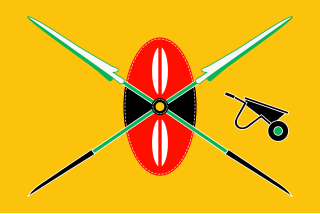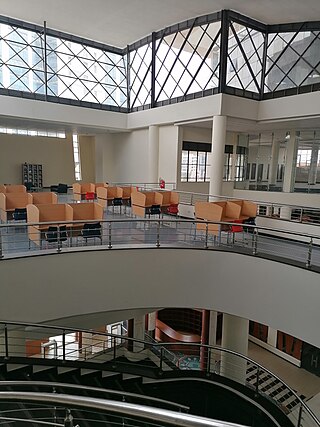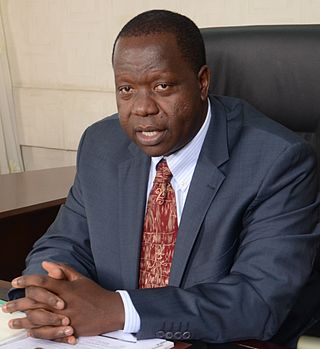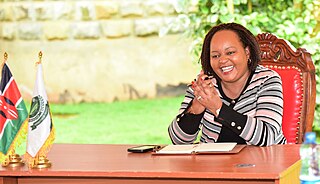Related Research Articles

The Kenya African National Union (KANU) is a Kenyan political party that ruled for nearly 40 years after Kenya's independence from British colonial rule in 1963 until its electoral loss in 2002. It was known as Kenya African Union (KAU) from 1944 but due to pressure from the colonial government, KAU changed its name to Kenya African Study Union (KASU) mainly because all political parties were banned in 1939 following the start of the Second World War. In 1946 KASU rebranded itself into KAU following the resignation of Harry Thuku as president due to internal differences between the moderates who wanted peaceful negotiations and the militants who wanted to use force, the latter forming the Aanake a forty, which later became the Mau Mau. His post was then occupied by James Gichuru, who stepped down for Jomo Kenyatta in 1947 as president of KAU. The KAU was banned by the colonial government from 1952 to 1960. It was re-established by James Gichuru in 1960 and renamed KANU on 14 May 1960 after a merger with Tom Mboya's Kenya Independence Movement.

The president of the Republic of Kenya is the head of state and head of government of the Republic of Kenya. The president is also the head of the executive branch of the Government of Kenya and is the commander-in-chief of the Kenya Defence Forces. The country's current president is William Ruto since 13 September 2022.

Uhuru Muigai Kenyatta is a Kenyan politician who served as the fourth president of Kenya from 2013 to 2022.

Jamhuri Day is a national holiday in Kenya, celebrated on 12 December each year. Jamhuri is the Swahili word for "republic" and the holiday officially marks the date when Kenya became a independent country on 12 December 1963, six months after gaining internal self-rule on 1 June 1963 from the United Kingdom. Kenya later became an republic, with the inauguration of Jomo Kenyatta as president taking place on 12 December 1964, exactly one year after Kenya attained independence in 1963. Kenyatta, having previously been sworn in as prime minister, continued as prime minister of newly independent Kenya, before assuming the position of president one year after Independence Day.

Corruption in the government of Kenya has a history which spans the era of the founding president Jomo Kenyatta, to Daniel arap Moi's KANU, Mwai Kibaki's PNU governments. President Uhuru Kenyatta's Jubilee Party government, and the current William Ruto's Kenya Kwanza administration has also been riddled with massive cases of graft.

Kiambu County is a county in the former Central Province of Kenya. Its capital is Kiambu and its largest town is Thika town. Kiambu County is the second most populous after Nairobi County. Kiambu County borders Nairobi and Kajiado Counties to the South, Machakos to the East, Murang'a to the North and North East, Nyandarua to the North West, and Nakuru to the West and has a population of 2,417,735.

Gatundu is a small town in Kiambu County of Kenya. It is known for the first Kenyan president Jomo Kenyatta who lived about three kilometres away from the town, as well as his son, Uhuru Kenyatta, now the 4th President of Kenya and former Member of Parliament representing Gatundu South Constituency. The town is located on a hill surrounded by many farms and residences.

China–Kenya relations refer to the bilateral relations between the People's Republic of China and Kenya. The two countries established relations in 1963, suspended ties temporarily in 1967, but ultimately re-established diplomatic relations in 1978. Since then, they have significantly expanded their economic and investment agreements, such that China is currently Kenya's largest trading partner. While the robust trade, investment, and Chinese-led infrastructure projects have benefitted Kenya's overall development and have been labelled by both governments as "win-win" collaborations, local media and foreign analysts have increasingly criticized both the potential consequences of Kenya's loans from China as well as Kenya's overall economic dependence on foreign capital and products. The most ambitious collaboration, the Standard Gauge Rail that was planned to connect Nairobi, Kenya, Uganda, South Sudan, and Rwanda using Chinese financing and contractors, has attracted even more controversy due to financial complications, questions on the legality of its tender process, and the alleged collateralization of Kenya's Mombasa port.

The Kenya National Library Service (KNLS) is a corporate body of the Kenyan government with a mandate to "promote, establish, equip, manage, maintain and develop libraries in Kenya". In its service provision, knls plays a dual role of Public Library and National library of Kenya.

General elections were held in Kenya on 4 March 2013. Voters elected the President, members of the National Assembly and newly formed Senate. They were the first elections held under the new constitution, which was approved in a 2010 referendum, and were also the first run by the new Independent Electoral and Boundaries Commission (IEBC). They coincided with the 2013 Kenyan local elections.
The Economic Stimulus Programme (ESP) was a spending plan initiated by the Government of Kenya to boost economic growth and lead the Kenyan economy out of the 2007–2008 Kenyan crisis and the Great Recession. It was introduced in the 2009/2010 Budget Speech in parliament by Finance Minister Uhuru Kenyatta. Its aim was to jumpstart the Economy of Kenya towards long term growth and development, after the 2007–2008 Kenyan crisis and post-election violence that affected the Kenyan economy. Other economic problems included prolonged drought, a rally in oil prices and food prices, and the effects of the Great Recession. The stimulus was a response to the decline in the economic growth rate from 7.1% in 2007 to 1.7% in 2009.
The Kenya Presidential Election Petition of 2013 was an election petition aiming to declare the Kenya presidential election 2013 invalid. The Petition was filed at the Supreme Court of Kenya on 16 March 2013.

The presidency of Uhuru Kenyatta began on 9 April 2013 after being sworn in as 4th president of Kenya and ended on 13 September 2022 after handing over to William Ruto. He succeeded Mwai Kibaki. During his inaugural speech Uhuru promised economic transformation by 2030, unity among all Kenyans, free maternal care and that he would serve all Kenyans. In 2017, he won a second term on 8 August and upon a Supreme Court verdict, the results were repealed. The resulting elections were controversial as Raila Odinga boycotted the elections and as the only other active candidate, he won by a 98% victory with the lowest turn out. A stalemate would result as Raila and His partners would carry out a parallel swearing in ceremony after Kenyatta's swearing in. Riots would break out as Raila entered the country resulting in a number of deaths. On 28 March the two partnered to form the Building bridges initiative ending the tense political atmosphere present in the country.

Fred Okengo Matiang'i is a former Kenyan Cabinet Secretary for the Ministry of Interior and Coordination of National Government. He assumed office on 8 July 2017 on acting capacity after the sudden Demise of Joseph ole Nkaissery, making him hold two cabinet positions concurrently, that is in the ministry of Interior and Coordination of National Government and Education, Science and Technology. He took up the full position of cabinet secretary for Internal Security and Coordination of National Government after being appointed by President Uhuru Kenyatta in January 2018 in the president's second comprehensive cabinet appointments. On 22 January 2019, President Uhuru Kenyatta, through Executive Order Number 1 of 2019, appointed him chairperson of the National Development Implementation and Communication Cabinet Committee. The committee is composed of all Cabinet Secretaries, The Attorney-General and the Head of the Public Service who acts as the secretariat.

Anne Mumbi Waiguru, EGH, is the second Governor of Kirinyaga County in Kenya, who has been in office since 22 August 2017. She was re-elected to office as Governor for her second 5-year term in the elections that were held on 9th August 2022. Previously, she served as the first Cabinet Secretary in the Ministry of Devolution and Planning. She was nominated by H.E. President Uhuru Kenyatta to the position on 25 April 2013. She is behind the establishment of Huduma Centres, places where Kenyan citizens can access government services more efficiently in their respective counties. as well as the 30% procurement rule, which accords at least 30 per cent of all supply contracts to the government to the youth, persons with disability and women.

Kenya–United Kingdom relations are bilateral relations between Kenya and the United Kingdom. The interactions between the two states have been positive and friendly since Kenya's independence in 1963. Both the UK and Kenya are members of the Commonwealth of Nations and engage with each other regularly on matters of military, economic and cultural importance. Kenya retains many aspects of British culture and governance, such as continuing to use English within administration, education and the law, driving on the left, hosting a diaspora community of Britons, and having a large Protestant population. The British military continues to play an important role in the country with Kenya hosting the UK's largest base in Africa, which provides vital anti-terrorism training to the Kenyan police. The British royal family, in particular the Queen had very close personal ties to the country. Elizabeth II was in Kenya when she received news that her father King George VI had died, and had made multiple state visits throughout her reign. To mark the 2022 Platinum Jubilee, Prince Edward visited the country to reinforce ties and celebrate Kenya's historic and current relationship with the UK. British tourism and finance are significant contributors to the Kenyan economy, with 100,000 British people visiting the country ever year for its national parks and wildlife.

The Jubilee Party of Kenya is a major political party in Kenya. It was the country's ruling party from 2016 to 13 September 2022. The party was founded on 8 September 2016, following the merger of 11 smaller parties. During the 2017 election, the Jubilee Party secured a plurality of seats in Parliament and the party leader, Uhuru Kenyatta, was re-elected president.

The presidency of Mwai Kibaki began at 11:00 AM GMT on Monday 30 December 2002, when Mwai Kibaki was inaugurated as the 3rd president of Kenya and ended on 9 April 2013 when he handed over to Uhuru Kenyatta. A NARC candidate, Kibaki was a businessman and member of parliament of Othaya constituency prior to his 2002 election victory over KANU nominee Uhuru Kenyatta.

Noordin Mohamed Haji, OGW, CBS is a Kenyan advocate of the High Court of Kenya, a position he has held for the last 21 years and the current Director of Public Prosecutions, replacing Keriako Tobiko who resigned in 2018. He is the second Director of Public Prosecutions after the promulgation of the Constitution of Kenya 2010, which made the Office an independent entity from the Attorney General's Office, which it had been previously under.
References
- ↑ https://documents1.worldbank.org/curated/en/971401498753976220/pdf/117082-BRI-P157228-PUBLIC-04-Kenya-Huduma-Final.pdf
- ↑ "Huduma Centres to be rollout in all counties - The Standard".
- ↑ https://ke.linkedin.com/company/huduma-kenya
- ↑ "Home". hudumakenya.go.ke.
- ↑ "President Uhuru Kenyatta launches Huduma Kenya Centre". www.deputypresident.go.ke. Archived from the original on 21 August 2014.
- ↑ Njeri, Kinyua (15 May 2019). "Huduma Namba (NIIMS): Why Register? Diaspora Registration, 666, Scandal?SEE Complete Guide". The Guide Kenya. Retrieved 15 May 2019.
- ↑ https://documents1.worldbank.org/curated/en/971401498753976220/pdf/117082-BRI-P157228-PUBLIC-04-Kenya-Huduma-Final.pdf
- ↑ FAQs: Huduma Namba